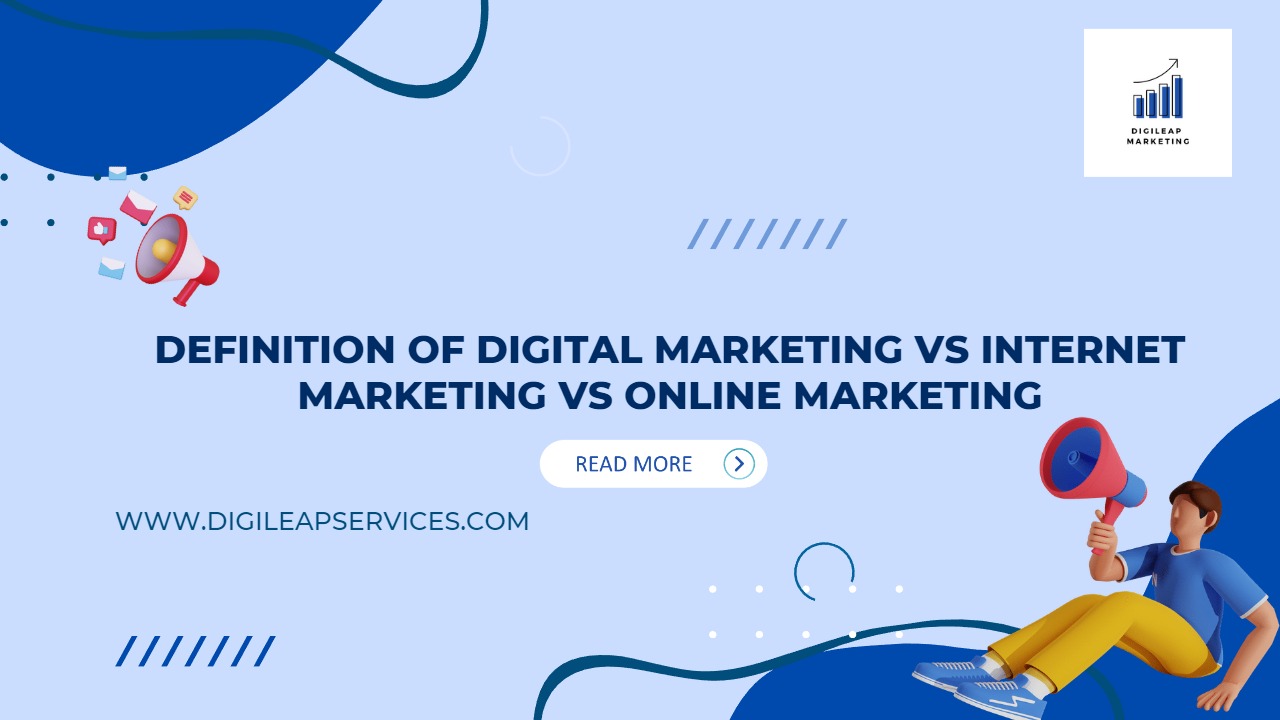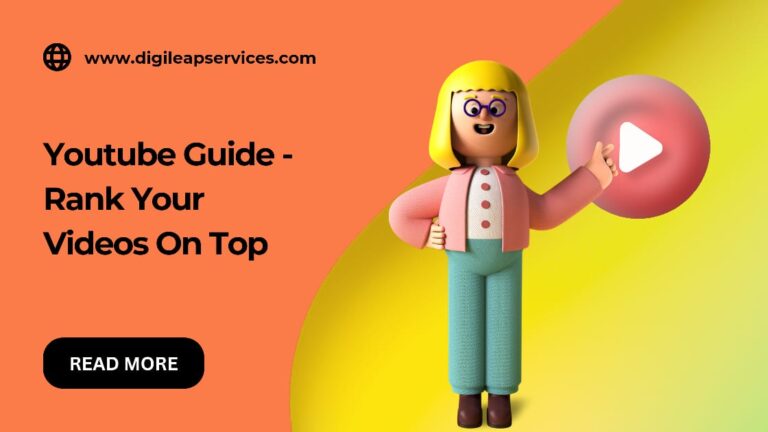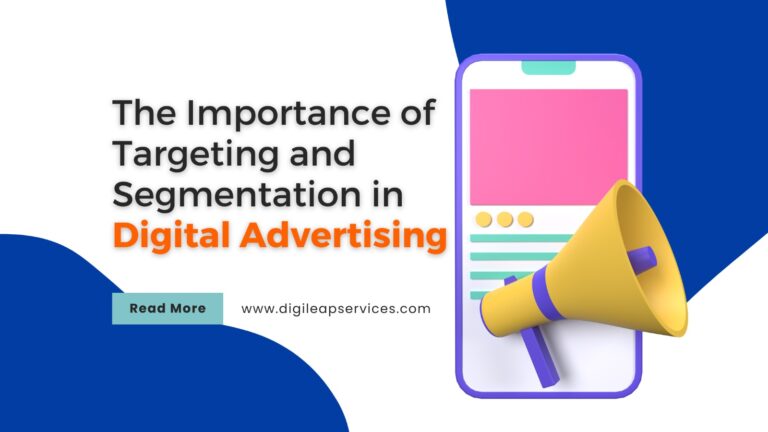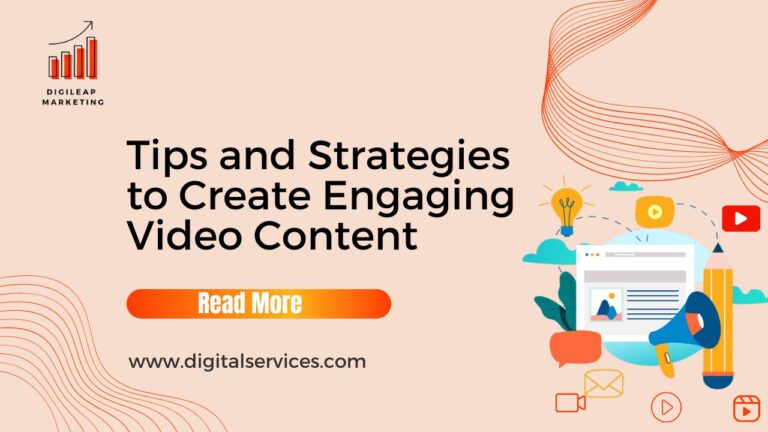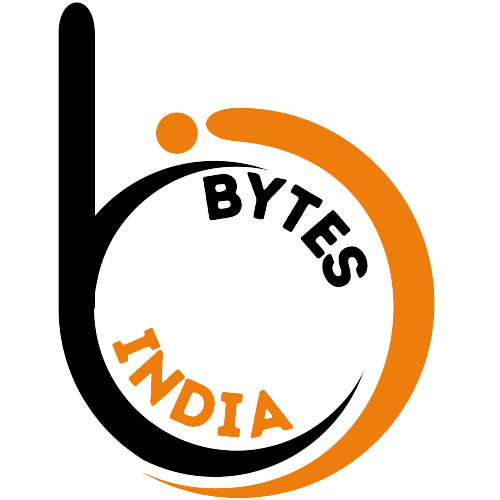Definition of Digital Marketing VS Internet marketing VS Online Marketing
Definition of Digital Marketing VS Internet marketing VS Online Marketing:
Digital Marketing
Digital marketing is a broad phrase that refers to various marketing tactics used to advertise your goods or services through digital platforms. This phrase serves as a catch-all for everything that promotes your company using a digital platform, from social networking sites to TV commercials.
Internet Marketing
Internet marketing, or online marketing, is a branch of digital marketing that encompasses techniques for online self-promotion. It uses the Internet to connect with leads for a marketing plan to be considered Internet-based. An online presence is the primary goal of internet marketing.
Digital and internet marketing are quite similar to one another. Online marketing is only a subset of digital marketing and refers to information distributed online. Digital marketing, on the other hand, covers any marketing that takes place on electronic devices.
What’s the difference, and is it significant?
Many have frequently asked this question. Whether the distinction in these words’ scopes mattered before digital marketing became the de-facto phrase. So I decided it was time for another brief look as 2023 approaches. Here is the most recent comparison between 2004 and today’s Google Trends.
Does it matter how these concepts are defined differently? Not; it’s semantics! However, it’s noteworthy to note how digital marketing vs. internet marketing has evolved. No, it doesn’t matter, but the scope and responsibility are vital to maximizing and managing the prospects, I say in my books when considering different definitions. Therefore, businesses need to agree on the scope of their digital marketing initiatives internally and with their agencies. The main distinction is whether digital marketing is perceived as only being about communications (online marketing) or whether it is broader, looking at prospects for new online businesses and revenue models as well as the underlying marketing technology.
Digital marketing vs. Marketing
Since some critics have said that we are now in a post-digital era with “virtually all” marketing being digital since digital media and technology have grown so prevalent. The broader question may be whether the term “digital marketing” is still appropriate. Since many firms are currently experiencing digital transformation and hiring the digital marketing positions and responsibilities needed to compete. Additionally, the growth in search volume implies that more individuals are looking for information about digital marketing.
I used this brief description to help remind us that investment in Internet marketing should be based on the outcomes given by technology, not the adoption of technology.
We’ve created the RACE marketing strategy framework on Smart Insights to assist and ensure that digital marketing is aligned with a company’s growth. It demonstrates how to accomplish e-marketing growth marketing in these five areas:
- Plan
- Reach
- Act
- Convert
- Engage
These digital technologies include digital delivery methods for digital television, such as cable and satellite, as well as Internet media, including desktop, mobile websites, and email.
In real life, internet marketing would involve using a corporate website along with online advertising strategies. Some companies who “want to be top in Google” associate Internet marketing with search engine marketing alone, but although this is vital, the scope is also crucial for digital media.
Here’s a list of six major categories of digital media communication channels that any company should take into account for its digital marketing strategy:
- Search engine marketing.
- PR online.
- Online Collaboration.
- Interactive advertisements.
- Elective email.
- Social media promotion.
You can use the desktop or mobile web to facilitate this. Our graphic marketing strategy guide has further information on the tactic.
These methods are employed to help bring in new clients and offer enduring clients services that strengthen client relationships.
Definitions of Internet Marketing, Online Marketing, and Digital Marketing
To be successful in Internet marketing, it is essential to integrate strategies with conventional media, such as print, television, and direct mail. This is what Multichannel e-marketing is.
Definition of Digital Marketing
Another phrase related to “marketing” is “digital marketing.” It is a phrase used more frequently by specialized digital marketing companies and new media trade journals. It has also been used by the Institute of Direct Marketing to describe its specialized professional credentials.
I developed a more detailed definition of the term— the one at the start of this article; to understand and demonstrate how digital marketing needs to closely align with more general marketing objectives and activities. This definition also shows how digital marketing involves much more than SEO and inbound marketing. Considering that this is the initial definition from 2005, how should it alter today?
Online marketing entails:
Applying various technologies such as the web, email, databases, mobile/wireless, and digital TV comprise online marketing channels.
To accomplish these goals:
Support marketing initiatives focused on profitable customer acquisition and retention throughout the customer lifetime and multi-channel purchase process.
By Utilizing These Advertising Strategies:
Recognizing the strategic value of digital technology and planning a strategy to reach and move clients to online services using conventional and electronic communications. Retention is done by increasing our understanding of our customers’ profiles, behaviors, value drivers, and loyalty drivers. Then by providing integrated, targeted communications and online services tailored to each customer’s needs.
The first section of the definition provides examples of the many communication and access platforms that make up the online channels that e-marketers employ to establish and strengthen connections with clients. PCs, smartphones, and interactive digital television (IPTV) are examples of access platforms or hardware. These devices deliver content and enable interaction through various online communication tools, including blogs, search engines, portals, organization websites, email, instant messaging, and text messaging. Some people consider voice calls on landlines to be a kind of digital marketing.
The second half of the explanation demonstrates that digital marketing should not be driven by technology but rather by the financial benefits of attracting new clients and retaining existing ones.
It also highlights the fact that digital marketing doesn’t work in a vacuum, but it works best when combined with other forms of contact including the phone, direct mail, and in-person interactions.
The entire purchasing process, from pre-sale to sale to post-sale and subsequent customer relationship development, should be supported through online channels.
Defining Online Marketing
Internet marketing and digital marketing are both equal terms for online marketing. Most professionals in the field would view it in this way.
However, it refers to digital media including the web, email, and wireless media in addition to the ministration of digital consumer data and electronic customer relationship management systems. Digital marketing is frequently thought to have a greater reach than online marketing (E-CRM systems).
At various stages of the purchasing cycle, a combination of digital and conventional channels enable customer communications and product delivery.
The summary of customer-centric marketing strategies is in the description’s concluding section. It demonstrates how a strategic plan is necessary for online business success to convert current consumers to digital channels and attract new ones by choosing the right blend of electronic and conventional communications. Online customer retention must be founded on building customer insight through research into the traits, actions, values, and other factors that make consumers loyal followed by the delivery of targeted, pertinent web and email messages.
Defining Customer Insight
Targeted marketing strategies for groups of clients with similar characteristics might be informed by specific insights. Based on the examination of qualitative and quantitative data, knowledge about the requirements, traits, preferences, and behaviors of consumers.
Final Thought
Businesses should use a range of media to promote. But they should also be aware of emerging trends because social media is currently the most effective channel for marketing, thanks to PPC strategies.
We hope that after reading this post, you will be able to make the best decisions for your marketing. Reach out to us today at www.digileapservices.com.

